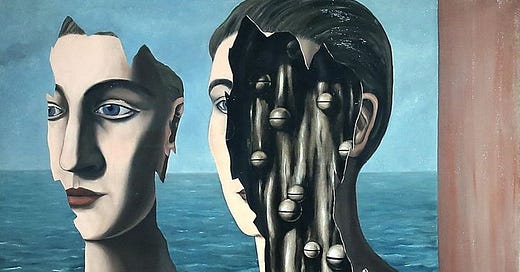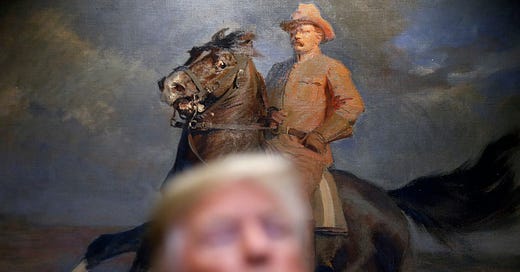
“ The happy man only feels at ease because the unhappy bear their burden in silence.”
Anton Chekhov
Surviving on whispers
There are many things we are incapable of comprehending, fully grasping, fully contemplating, and self-censorship is one of those mysterious things. However, it is mysterious only because the current orthodoxy praises Freedom of Speech while forgetting Freedom of Will. In a time where the fixation is on censorship, on 'cancel culture', or political correctness, self-censorship is hidden in the cacophony of despondencies.
Unlike many types of censorship, self-censorship has the particularity of not being seen; it cannot be visible; its whole objective is to enable the speaker to make his ideas survive in darkness. The speaker becomes Hercules in the underworld. But unlike Hercules, he is condemned to perpetually cross the Styx river. To self-censor is to accept self-castration; to live with unreversed intellectual amputations. Thoughts live off imagination, eat the leftovers of semi-expressed sentiments, and sleep on the hopes of being one day understood. Self-censorship is not a defense mechanism; it is not a coping mechanism; it is a survival mechanism, where fear is organically incorporated into the intimacy of speech-making.
A primitive manual sensing of terror is the only reliable measurement of the radioactivity of words. It is far more complex than mere censorship, where the red lines are clear, the banned words are known, and where the speaker gets an instant punishment. What they have in common, however, is the conditioning, since it is always 'the other' who relentlessly enforces the rules of good and purified speech. 'The other' resembles the frightening Horla of Guy de Maupassant1, impossible to know when exactly he will appear to put on the speaker the chain leash; made of insults, accusations, and ad hominem attacks.
Sealed lips, bleeding voice
“There are people who exist in this world not like entities but like the speckles or spots on something.”
Nikolai Gogol
The important and yet most forgotten aspect when reading or discussing 'self-censorship', is the 'self' component. Contemporary researchers are fetishists of empirical research, surveys here, polls there, scaled feelings even, why not? It is no surprise, then, that self-censorship is not understood as a deep, primal, and subconscious action to avoid a displeasing reaction.
'Subconscious' is a key term since the impulse to self-regulate speech escapes the sea of total awareness. One does not necessarily know why he is adjusting the sentences and concealing his ideas, but he is fully conscious of the urgency of doing so. The fear of being reprimanded or ridiculed dominates the spirit of the speaker. He is haunted by the daemon of proper conduct. He is at the mercy of the listener or reader. He is submissive. He is a slave to interpretation.
The most disagreeable truth about self-censorship is that it infects totalitarian regimes like the democratic ones. It does not discriminate. This is difficult to admit, since democratic and relatively free countries think of themselves as immune to any type of suffering. They dismiss it as a self-inflicted injury, they like to scream: “Who on earth is preventing you from speaking your mind!”
Many miss the point: the lips are sealed not because of the wrongness of a speech, or the vulgarity of words, but because there are no serious listeners. Self-censorship is seen as the only way to avoid confrontation, even if it means societal exile.
Today, the problem is not self-censorship as a concept but the denial that it exists, that it is present, and some even experience it. We should always keep in mind that our epoch is arrogant, sees itself superior, better, far more sophisticated, oblivious to its stupidity or flaws. Too good to ever be questioned. Indeed, it has never been so easy to be a dissident; it is simply a matter of how loud one can say what everyone is seeing but does not dare to name. To be a dissident means to unveil the unbearable murmurings of the realities of self-censorship.
Self-censorship should be understood as a taboo in our tabooless societies. The fact that anyone would impose on themselves rules is incomprehensible and will remain this way. “There is nothing to fear if you say what you really believe” is modern mythology. Only this time, as the voices bleed, no one knows who the Gods are.
“I have seen mad people, and I have known some who were quite intelligent, lucid, even clear-sighted in every concern of life, except on one point. They could speak clearly, readily, profoundly on everything; till their thoughts were caught in the breakers of their delusions and went to pieces there, were dispersed and swamped in that furious and terrible sea of fogs and squalls which is called MADNESS.”
The Horla (1887), Guy de Maupassant
















Hmmmm, I was thinking about self censorship recently. Like the various repression tactics that exist in democratic and non-democratic regimes.. the different flavors of self censorship. You make great points and this is well written - almost poetic.
This is a thought-provoking piece. I don’t think self-censorship is that mysterious. Human beings, from tender age, are raised to “behave”, avoid “displeasing” others, not to argue, not to speak up. It’s a social construct. The desire to please is a virus passed on from childhood. That being said, conformism is like the “mayonnaise” that’s supposed to hold people together to ensure its perennity. We become "declawed" civilized beasts in the process. It takes a lot of guts to break free from the “conformity” mentality to withstand social pressure; first, it requires being AWARE of it and the guts to defy a ginormous conditioned entity. One needs to be so grounded and deeply rooted like an Argan tree to withstand storms. It is a conscious process.
There is the sense of belonging; people crave to belong to a clique or community. They want to be in tune in a “social symphony”. People retune themselves and their beliefs to whatever mainstream ideas become acceptable.
I have seen the manifestations of “morality of variable geometry” among people who stood against something and then defended it ferociously. In light of recent events, I remember people who told me “we do business, not politics” when I was speaking up about the atrocities of the Isr*eli regime against Palestinians but later saw the same people ramble on and on about standing with Ukraine. I also reminisce over a conversation I had with a friend years ago about a certain racist Isr*eli pianist that I used to admire but despised after realizing what a despicable racist he is; that friend told me one should dissociate the artist from the person, but denounced artists who were Russian just a week ago. The fear of being excluded exceeds the desire to be righteous these days. I feel a certain bitterness about that.
Apart from the conformism, there is the notion of survival that you talked about. We are given the illusion of “freedom” that there are no repercussions but oppression in our modern times can be very subtle but also brazen when the stakes are high. Retaliation comes in different forms.
P.S. my profile picture shows a man with many swords brandished against him. Usually a symbol of "unpopular opinion" in the Twittosphere :D